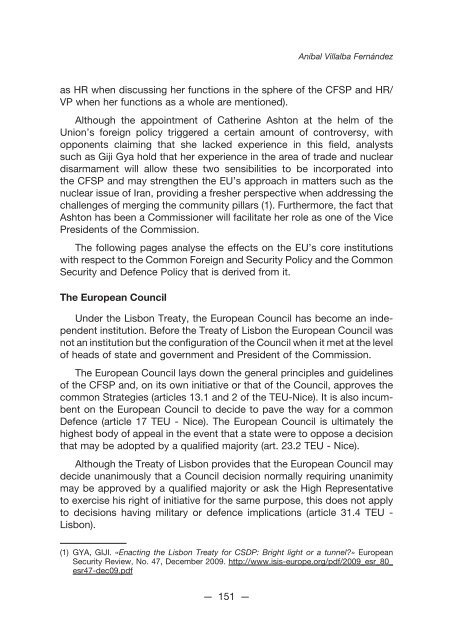Strategic Panorama 2009 - 2010 - IEEE
Strategic Panorama 2009 - 2010 - IEEE
Strategic Panorama 2009 - 2010 - IEEE
You also want an ePaper? Increase the reach of your titles
YUMPU automatically turns print PDFs into web optimized ePapers that Google loves.
Aníbal Villalba Fernández<br />
as HR when discussing her functions in the sphere of the CFSP and HR/<br />
VP when her functions as a whole are mentioned).<br />
Although the appointment of Catherine Ashton at the helm of the<br />
Union’s foreign policy triggered a certain amount of controversy, with<br />
opponents claiming that she lacked experience in this field, analysts<br />
such as Giji Gya hold that her experience in the area of trade and nuclear<br />
disarmament will allow these two sensibilities to be incorporated into<br />
the CFSP and may strengthen the EU’s approach in matters such as the<br />
nuclear issue of Iran, providing a fresher perspective when addressing the<br />
challenges of merging the community pillars (1). Furthermore, the fact that<br />
Ashton has been a Commissioner will facilitate her role as one of the Vice<br />
Presidents of the Commission.<br />
The following pages analyse the effects on the EU’s core institutions<br />
with respect to the Common Foreign and Security Policy and the Common<br />
Security and Defence Policy that is derived from it.<br />
The European Council<br />
Under the Lisbon Treaty, the European Council has become an independent<br />
institution. Before the Treaty of Lisbon the European Council was<br />
not an institution but the configuration of the Council when it met at the level<br />
of heads of state and government and President of the Commission.<br />
The European Council lays down the general principles and guidelines<br />
of the CFSP and, on its own initiative or that of the Council, approves the<br />
common Strategies (articles 13.1 and 2 of the TEU-Nice). It is also incumbent<br />
on the European Council to decide to pave the way for a common<br />
Defence (article 17 TEU - Nice). The European Council is ultimately the<br />
highest body of appeal in the event that a state were to oppose a decision<br />
that may be adopted by a qualified majority (art. 23.2 TEU - Nice).<br />
Although the Treaty of Lisbon provides that the European Council may<br />
decide unanimously that a Council decision normally requiring unanimity<br />
may be approved by a qualified majority or ask the High Representative<br />
to exercise his right of initiative for the same purpose, this does not apply<br />
to decisions having military or defence implications (article 31.4 TEU -<br />
Lisbon).<br />
(1) GYA, GIJI. «Enacting the Lisbon Treaty for CSDP: Bright light or a tunnel?» European<br />
Security Review, No. 47, December <strong>2009</strong>. http://www.isis-europe.org/pdf/<strong>2009</strong>_esr_80_<br />
esr47-dec09.pdf<br />
— 151 —

















